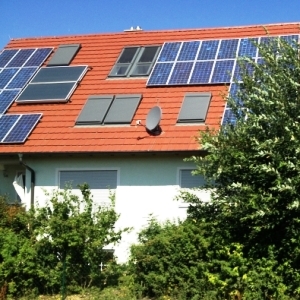Arizona solar leasing companies must now justify how they estimate the savings.
Solar leasing companies in Arizona must now justify how they estimate the savings from installing solar panels, according to a bill signed by Gov. Doug Ducey in late March.
The law targets a practice that its author, Sun City Republican state Sen. Debbie Lesko, said is rampant throughout her district. Marketers for solar leasing companies promise free incentives, protection against rising utility costs and even increased home values in exchange for solar panels.“My mother is 86 and she gets these things in the mail … and it says ‘free, free’ everything is ‘free.’” Lesko told Arizona Business Daily. “She was like, ‘Debbie, should I look in to this?’ and I’m like ‘absolutely not.’”
Such fliers from leasing companies, Lesko said, have estimated as much as 7 percent year-over-year increases on Arizona Public Services Company utility bills, despite rates historically increasing less than 2 percent over the last 20 years.
The bill was met with resistance from solar industry representatives shortly after it was introduced in February. At a March 7 meeting of the Senate Water and Energy Committee, opponents seized the opportunity to speak against it. Former state lawmaker Lucy Mason currently faces possible punishment after she registered as “representing self” to speak at the hearing despite now serving as the executive director of the Arizona Solar Energy Industry Association.
“Of course ... the solar industry have … come after me the whole time I’ve done any of this type of legislation,” Lesko said. “In fact last year, on 1465, they came after me in the papers and on social media before they even saw language of the bill, before they even saw what was in it.”
Lesko was referring SB 1465, introduced and passed last year that required greater accountability from solar contractors. The law requires solar leasing companies to provide clearer language with regards to leasing agreements.
In theory, solar leases allow homeowners to pay for the installation of solar panels in monthly installments instead of buying them upfront, while using the energy generated from the panels to lower utility costs.
Lesko said the latest legislation is designed to help homeowners who were promised increased values to their home, as well as energy savings, who instead find that the lengthy lease agreements with the solar panel companies prevent the sale of their home. She said the first tip was from a neighbor who attempted to sell their home for nearly a year to move into an assisted living facility, but couldn’t secure a a buyer. At that time, she said, over 100 people had looked at the home but did not want to take over the remaining 17 years on the lease of the solar panels.
“The reason they went into a 20-year lease, even though they’re in their 80’s, was that the sales person told them ‘don’t worry, it’s going to increase the value of their home by $25,000,’” Lesko said. “In fact, they had to reduce the price of their home in order to sell it.”
Lesko said it got her to start looking into the issue and found many people coming forward with similar issues.
In addition to the wording about energy savings, the latest law also requires an engineer or “person who is knowledgeable” about the system to be present when its installed. Homeowners can’t be billed lease payments until the system is installed, and the system cannot be installed until the company gets approval from the utility company whose power grid they will be connecting to.
“I’m just doing this to help protect consumers, because I’ve seen problems arise from this overly aggressive marketing of the solar rooftop leases,” Lesko said. “There’s a number of the people … they just don’t understand what they’re getting into.”

